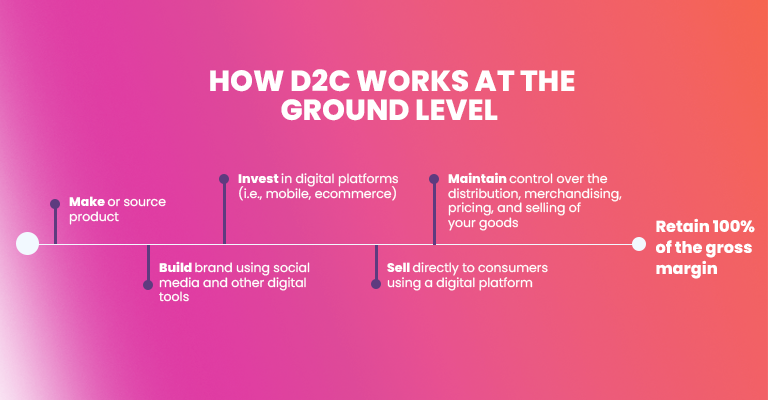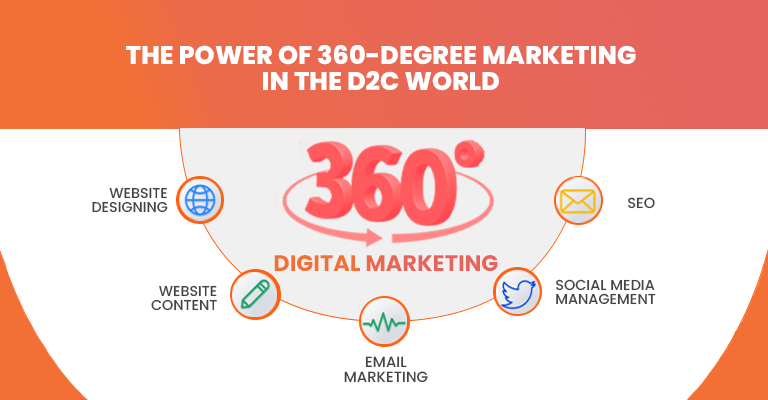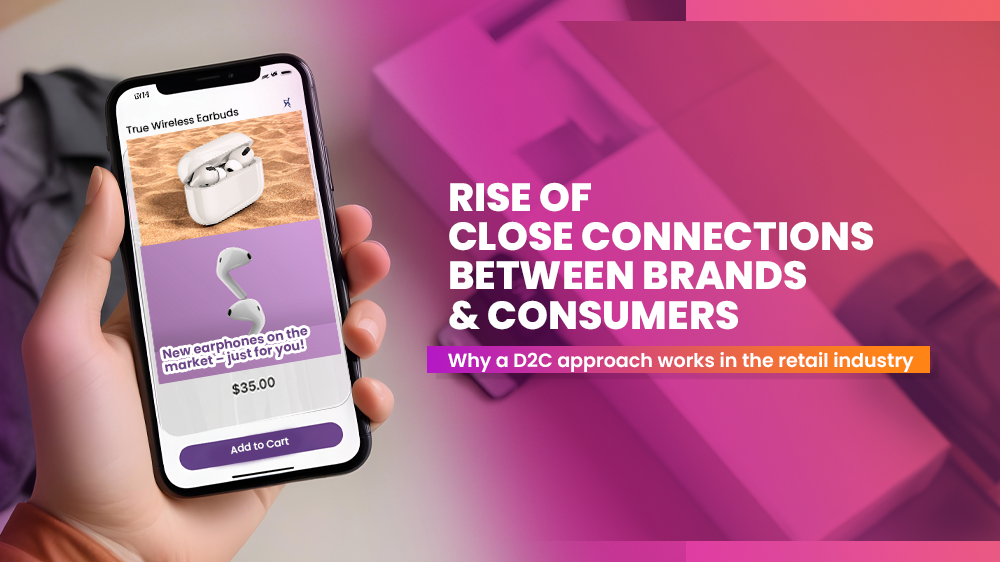How Direct-to-Consumer (D2C) Brands are Reshaping the FMCG and Retail Landscape
The retail goods industry has undergone a tremendous shift in terms of buyer habits, expectations, and customer experience & satisfaction. Today, brands want to provide their end-consumers increased convenience and personalization through their products sold. This change in consumer behaviour has given rise to the Direct-to-Consumer (D2C) brands in the retail and FMCG landscape. A shift in decades-long dominance that earlier belonged to traditional models of sales and marketing is now noticeable. Our latest blog elaborates more on this subject for brands and covers different facets of the D2C marketing model such as its advantages, business value additions, brief working process, and future expectations.

The Advantages of Building a D2C e-Commerce Model for your Retail Business
Companies that sell fast-moving goods to their consumers know that the latter expect more than just products; they seek experiences, personalization, and immediate gratification. This expectation has paved the way for the rise of Direct-to-Consumer (D2C) brands. The Gen-Z generation predominantly expects immediate gratification in terms of this industry, and wants everything delivered as fast as possible, without having to step out of their houses.

Here’s where D2C brands can thrive in the retail environment, especially in the fast-moving consumer goods industry. As the name suggests, this model eliminates the middleman, allowing them to control the customer journey directly from product development to purchase and finally delivery. This can involve the brands to offer their products directly via mobile apps, dedicated websites, and web-landing webpages. The delivery systems are also managed by the brands, thus following non-dependency on third-party people.
This connection encourages brand loyalty and derives valuable data to the brands who can use it securely through compliant means to provide the much-needed personalization in product offerings.
Brands that work with a D2C approach can provide their end customers faster delivery of products. As the middleman is eliminated, brands can guarantee to the customers about the originality and authenticity of their products. In case of electronic goods – aspects such as warranty, security, and other protections can also be assured.

D2C brands also operate with a particular finesse and agility that can’t be matched by market players using conventional other business models. Often, this brings in a sense of adapting to changing consumer demands and capitalizing on emerging market opportunities. For example, a D2C personal care brand can readily introduce a new product line based on latest marketing trends and launch the products including delivery in a much shorter span of time.
The Value Addition of 360-degree Marketing in the D2C World
A 360-degree marketing approach in a holistic manner can provide invaluable support to D2C brand and help them flourish. The immediate value addition is growing customer relationships in a positive direction and a seamless brand experience with this marketing approach. The consumers can witness a cohesive, end-to-end handling of their ordered products, whereas the brands themselves can develop a unified identity that resonates with their target audience.

Data is like oil in the e-Commerce and retail industries, and a rich trove of customer data can enable D2C brands to create targeted marketing campaigns. A 360-degree marketing strategy can help D2C brands leverage this data to identify consumer segments and develop personalized marketing messages. Additionally, this data can also provide insights into improving product development and refinement, ensuring that product/service offerings cater to specific consumer needs.
Lastly, an all-rounder 360-degree approach provides D2C brands with a unique opportunity to foster strong relationships with their customers. Advocating about a brand plays a crucial role in establishing its positioning in the market along with building a strong recall value. There are several strategies in this context for building an engaged online community through effective social media management and brand storytelling. Fostering brand advocacy via a multi-channel approach encourages customer loyalty, who further can spread the word organically, thus optimizing the fast-moving services aspect of D2C brands.
Facing Challenges Against Established Brands
There certainly has been growth in adoption of D2C processes in the last couple of decades, especially after the software boom of the early 2000s. However, there still are a few challenges that particularly new brands might need to overcome against established brands.
For example, many well-known brands that have been operating in the industry operate in the physical retail space as well as through a limited online medium. Because of their wide target audience and possessing high customer trust, up-and-coming companies who mainly rely on the online medium might need to incorporate other marketing strategies that popular brands don’t. For example, partnering with UPI payment apps such as CRED or PayTM can be a good option for FMCG brands that want to push their products through a gamification marketing strategy.
Conclusion: Adapting and Thriving in a Changing Market
The rise of D2C brands signifies a shift in consumer priorities and a demand for a more direct connection with the products they choose. This presents both challenges and opportunities for established brands. By adapting marketing strategies to prioritize data-driven insights and authentic customer engagement, brands can navigate this changing landscape and ensure their continued success. For brands who want to implement a smoothly running marketing approach, Dust Value – a 360-degree marketing agency can help them achieve the same and derive ample business growth.
